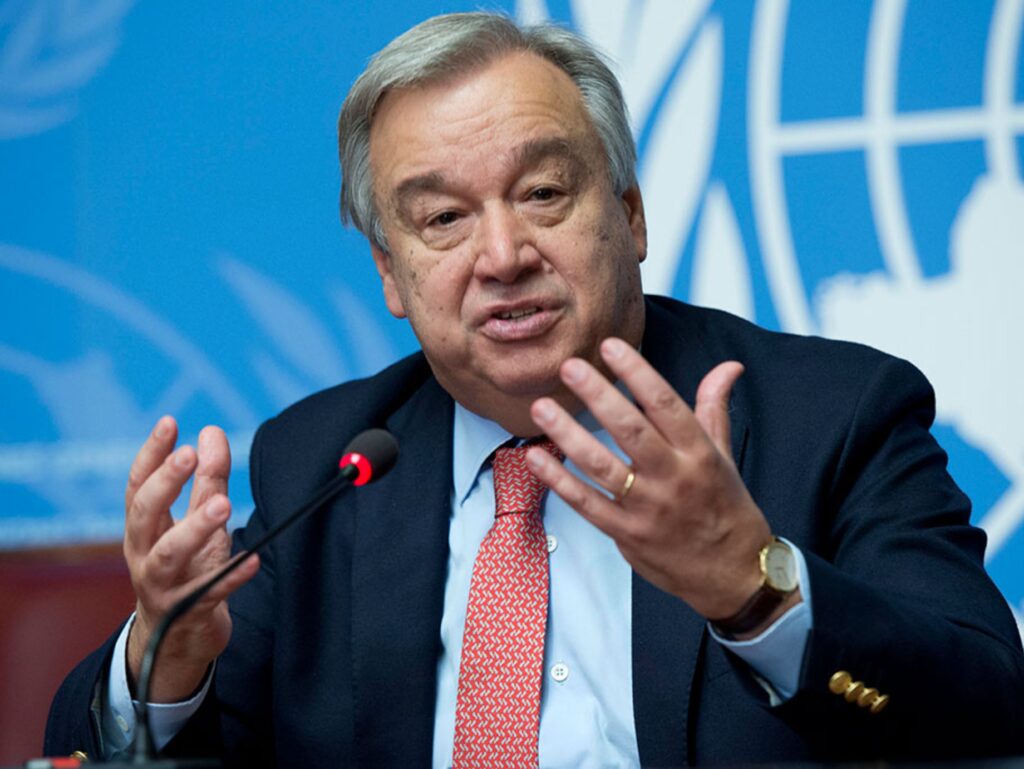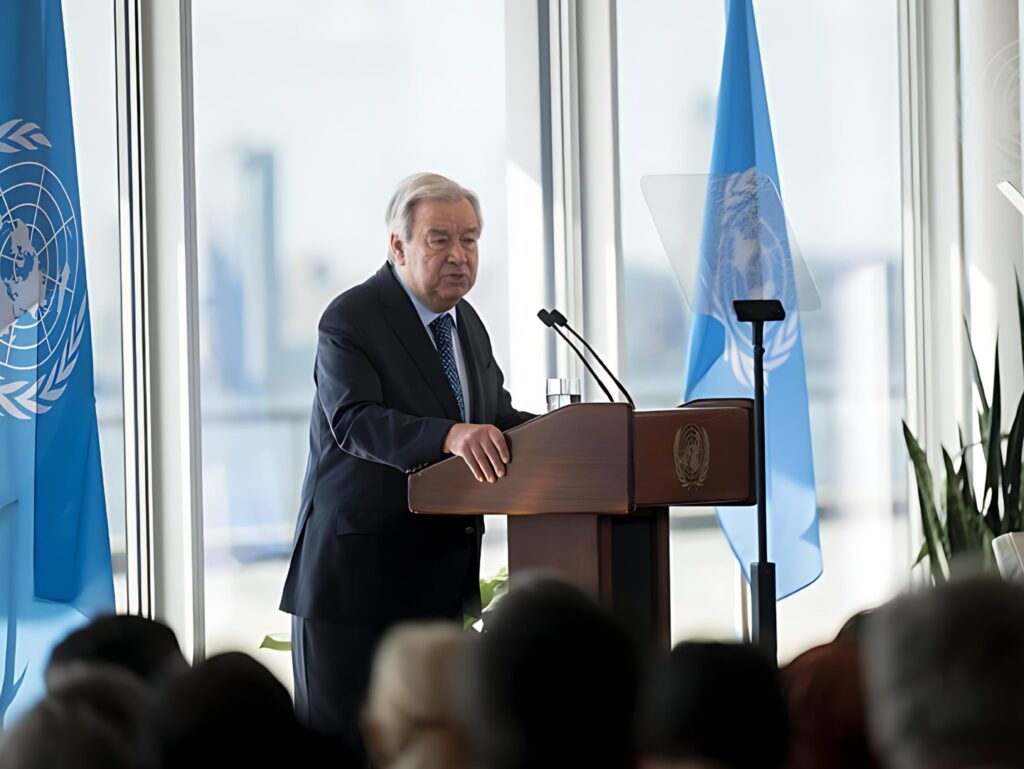At the heart of the Amazon rainforest, in Belém, Brazil, COP30 has brought together leaders and negotiators from nearly 200 countries. This summit is not only a milestone for reviewing the progress of the Paris Agreement but also a crucial moment to accelerate global emissions reduction and rebuild international trust.
United Nations Secretary-General António Guterres has repeatedly issued clear warnings in public speeches and media interviews. He stressed that the window for effective global climate action is rapidly closing. If countries fail to reverse the emissions curve within the next decade, the consequences will extend far beyond the economic realm, threatening the very future of humanity.
“We are in a race against time. If we cannot bend the emissions curve within this decade, it will not just be the economy at risk, it will be the future of humanity itself,” Guterres warned.
The Obsession with Fossil Fuels Is Undermining the Global Economy
Guterres’s critique of energy policy has become a central theme in his COP30 remarks. He stressed that with the window for global climate action rapidly closing, the continued dependence of some countries and companies on fossil fuels is no longer just an environmental issue but a direct threat to the global economic system.
“Clinging to fossil fuels is an act of economic self-sabotage. Renewable energy is already more competitive. What we need is political will, not excuses.”
Over the past decade, the costs of solar, wind and storage technologies have plummeted, making renewables the more affordable option in most markets. Yet capital flows remain misaligned, with massive public and private funds still being poured into building or extending fossil fuel infrastructure. This locks the global energy system into outdated models.
Such investments are likely to lose value rapidly in the coming wave of decarbonisation, becoming what economists call “stranded assets.” Guterres warned that this financial misallocation not only undermines global climate targets but also poses serious risks to national budgets, industrial competitiveness and employment structures.
“Science and markets have already given us the answers. The only missing piece is political action,” he reiterated, emphasising that the real obstacle lies not in technology or economics but in the lack of political resolve. If governments continue to delay the energy transition, the future economic and social costs will far outweigh the adjustments required today.
From Emission Pledges to Climate Justice: A Global Call for Realignment
One of the core agendas of COP30 is to urge countries to submit new Nationally Determined Contributions (NDCs) to realign the global emission reduction pathway. Guterres, together with Brazilian President Lula, has called on nations to present concrete and ambitious reduction plans both before and after the summit, instead of stalling for time.
“Without new emission targets, the world will move forward in darkness. Countries must submit more ambitious and detailed NDCs around COP30,” Guterres warned. He stressed that this is not merely a procedural document update but a fundamental reorganisation of global collective action. Nearly one hundred parties have announced or submitted updated targets, but several major emitters have yet to act, weakening overall progress.
He also underlined that NDCs must go beyond technical measures and emissions data, and move in tandem with climate justice. This year, more than 240 civil society organisations jointly called on COP30 to address the historical injustices of colonialism, resource extraction and slavery by incorporating these responsibilities into the global climate framework.
“The regions suffering most from the climate crisis are often those that were historically exploited. We must ensure that financing and technology reach the countries and communities that need them the most.”Guterres urged governments and international financial institutions to overhaul funding allocation and approval mechanisms, breaking through layers of bureaucracy to prevent resources from being trapped in agreements rather than reaching affected communities.

Reshaping Financial Flows and Decision-Making Power
At this year’s COP30, “climate justice” and “financial distribution” have taken centre stage like never before. More than 240 civil society organisations have called on nations to confront the historical injustices of colonialism, resource extraction and slavery by embedding historical responsibility into the climate action framework and creating fairer structural support mechanisms.
Guterres has made his position clear, stressing that this is not merely a technical negotiation but a matter of global power dynamics and political accountability.
“The regions most affected by the climate crisis are often those that have been historically exploited,” he said, urging governments and international financial institutions to thoroughly review and reform their funding allocation and approval processes. He emphasised the need to cut through bureaucratic red tape so that climate finance can reach frontline communities.
He also pointed out that advancing climate action is not only about fair distribution but about fundamentally reshaping economic structures and policy directions.
“Science has shown the way, and the markets are changing. What we need now is courage from decision-makers. We must mobilise public and private capital and adjust financial rules to make the green transition the mainstream,” he declared.
Guterres warned that if nations continue to prioritise short-term interests, delay the energy transition, and channel resources into fossil fuels, the social and economic costs they will face in the future will multiply. The climate crisis is not a distant issue; it is a policy choice that must be made now.
Echoes of Belém: From the Rainforest to a Defining Crossroads
The choice of Belém as the host city for COP30 carries profound symbolic weight. As the gateway to the Amazon rainforest, it stands at the heart of the global climate system and reflects humanity’s collective decision-making in the face of a rapidly intensifying crisis. Guterres has repeatedly warned that the world must not underestimate the Amazon’s critical role in stabilising the planet’s climate.
“The Amazon is degrading. This is a wake-up call. If we continue to ignore it, nature will force us to face reality in far harsher ways.”
At the same time, youth groups from around the world are making their voices heard outside the conference venue through performances, policy proposals and open dialogues, bringing an intergenerational force to this global gathering. Guterres joined the youth forum to exchange views with young representatives, stressing that they are not bystanders but central actors in shaping history.
“This generation of leaders owes young people a liveable future. Their voices must be part of decision-making.”
From the degradation of the Amazon to the rising chorus of youth, and the intense negotiations between nations, COP30 has become more than a climate summit. It is a defining moment at the intersection of political will, economic structures and historical responsibility. Guterres’s role is not merely that of an advocate, but of a global figure sounding what may be humanity’s final warning.
“There is no Planet B. COP30 represents a critical turning point for humanity in confronting the climate crisis. This is not a discussion for the distant future. It is a decision we must make now.”

Recommend for you:
COP30 Leaders|COP30 CEO Ana Toni: If You Are Not Part of the Solution, You Are Part of the Problem!